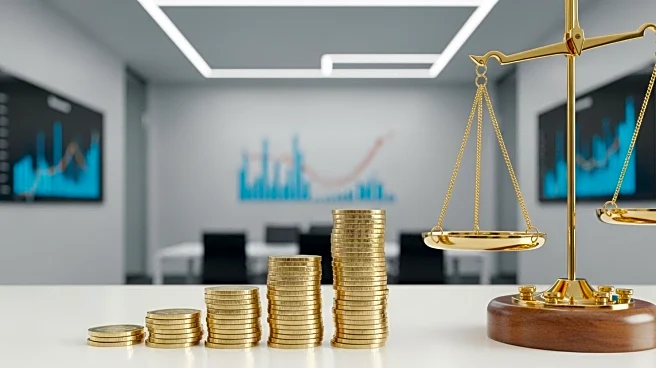What's Happening?
The 'debasement trade' has become a focal point on Wall Street, driven by geopolitical tensions, potential lower interest rates, and expansive fiscal policies globally. This trade involves investors moving away from the U.S. dollar, which is perceived to be losing value due to government borrowing and money printing. As a result, investors are increasingly turning to assets like gold, cryptocurrencies, stocks, and real estate that are expected to retain their value. Gold has seen a significant surge, rising over 50% in 2025, while Bitcoin has surpassed the $120,000 mark. The shift reflects a growing distrust in fiat currencies, with global central banks increasing their gold reserves over U.S. Treasurys for the first time in nearly three decades.
Why It's Important?
The shift towards the debasement trade highlights significant concerns about the stability of the U.S. dollar and broader economic implications. As investors seek alternatives to traditional currency holdings, this trend could impact the U.S. economy by influencing interest rates, inflation, and investment strategies. The move away from the dollar could lead to increased volatility in financial markets and affect international trade dynamics. Additionally, the rise in gold and cryptocurrency values suggests a potential reevaluation of asset allocation strategies, with investors seeking to hedge against currency devaluation and inflation risks.
What's Next?
As the debasement trade gains traction, financial institutions and investors may continue to adjust their portfolios to mitigate risks associated with currency devaluation. This could lead to further diversification into alternative assets, including precious metals and cryptocurrencies. Policymakers may need to address the underlying causes of currency debasement, such as fiscal policies and government debt levels, to stabilize the dollar and reassure investors. The ongoing geopolitical tensions and economic policies will likely continue to influence market dynamics and investor behavior.
Beyond the Headlines
The debasement trade raises ethical and strategic questions about the reliance on fiat currencies and the role of government policies in economic stability. It underscores the need for transparency and accountability in fiscal management to prevent erosion of currency value. The trend also reflects broader shifts in global economic power, as countries and investors seek to diversify away from traditional currency systems. This could lead to long-term changes in how assets are valued and traded, potentially reshaping financial markets and investment strategies.










